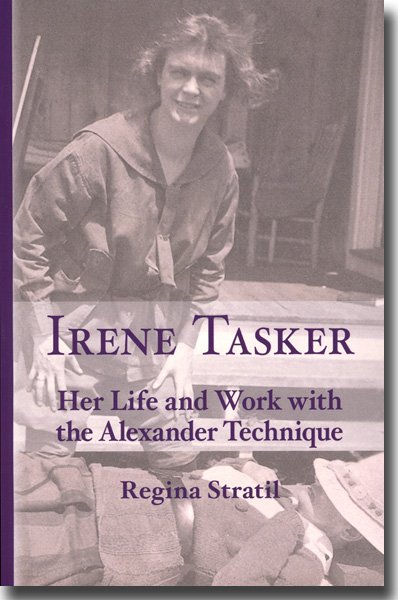In Conversation: Regina Stratil's Path to Uncovering Irene Tasker's Story
The ASO Newsletter - 41st Edition
Enabling greater understanding of the Alexander Technique.
Introduction
In the 41st edition of the ASO newsletter, Malcolm Williamson engages in a captivating dialogue with Regina Stratil, the author of the book "Irene Tasker - Her Life and Work with the Alexander Technique." The conversation delves into Stratil’s journey in researching and writing the book, shedding light on her research and compositional process. She shares insights into Tasker's life and contributions, highlighting the significance of this important figure within the historical tapestry of the Alexander Technique. Additional notes are provided for further reading, along with links to find the discussed materials.
About Irene Tasker
Irene Tasker's influence on the Alexander Technique was varied and far-reaching. Among her many achievements and contributions are:
Helping Alexander with his books.
Starting the Little School and pioneering the application of the Technique to the education and schooling of children.
Being the first teacher and non-family member of Alexander to start an independent and successful teaching practice – a milestone for the Alexander Technique as a profession.
Achieving remarkable success in South Africa within just a few years, especially within educational circles. Her main assistant, Joyce Roberts, who apprenticed with her in Johannesburg was recognised as a teacher by STAT, and later trained teachers in South Africa.
Pioneering application work, i.e. the application of the Alexander Technique to an activity.
Irene Tasker (1887–1977) was a hugely influential Alexander Technique teacher and assistant to F. M. Alexander. After reading Classics at Girton College, Cambridge, she became interested in progressive education and trained with Maria Montessori in Rome in 1913, where she met Ethel Webb (already an assistant to Alexander) and Margaret Naumburg. Webb introduced her (and Naumburg) to the Alexander Technique, and Tasker subsequently had lessons with Alexander in the autumn of 1913.
In 1916, Tasker accepted an invitation by Naumburg to teach at her Montessori class in New York. Naumburg had at that time already invited Alexander to teach his technique in New York and, in 1917, Tasker resigned from her post at Naumburg's school to become Alexander's assistant. Tasker was – alongside Ethel Webb – helping Alexander with his books as well as assisting with pupils and thereby being trained in an apprenticeship way.
In 1924, encouraged by Alexander, Tasker started a school for children at Alexander's teaching practice in London. It was nicknamed the "Little School". Teaching of all subjects was based on the principles of the Alexander Technique. Tasker directed the growing school until 1934 when she resigned. Alexander stated in his Appendix to The Use of the Self that the success of the Little School allowed him to start a teacher training course in 1931 as it provided trainee teachers with the opportunity for gaining practical experience. Tasker visited Alexander's first teacher training course whenever her duties at the Little School allowed and her notes of these visits as well as lessons with Alexander and other notes are published in full in the Irene Tasker biography.
From 1935 to 1948 Tasker pioneered the Alexander Technique in South Africa generating much interest in the Technique among South African educationalists. Her success and the enthusiasm of influential supporters to incorporate the Alexander Technique into the education system in the Transvaal triggered a fierce backlash from leaders in the then young field of physical education. This culminated in the libelous Manpower article for which Alexander successfully sued for defamation in 1948.
Irene Tasker returned to England in 1949 and maintained a busy teaching practice and a strong interest in the furthering of the Alexander Technique until shortly before her death in 1977.
Links:
The Irene Tasker biography can be ordered online from Mouritz: https://www.mouritz.org/shop/
Reviews of the Irene Tasker biography in the bibliography section of the Mouritz website can be found here
Link to the Graz Alexander Technique Studio: https://atstudio.at/gb
Presenters Short Bio
Regina Stratil is the author of the biography Irene Tasker: Her Life and Work with the Alexander Technique (Mouritz, 2020, 2nd edition in paperback 2022).
Regina trained in London 2011–2014, is STAT-certified, and has been running a private Alexander Technique teaching practice ever since. She worked part-time for the Walter Carrington Educational Trust 2014–2018 where she discovered her interest in the history of the Alexander Technique while cataloguing material in the Walter Carrington Archives. This led to her researching Irene Tasker's life and work. In 2018 she moved back to Graz, Austria, where she now teaches. Since 2022 Regina also assists Jean Fischer at his teacher training course in Graz.
Malcolm Williamson studied at the Royal College of Music and played the viola with many orchestras including the Iceland Symphony and Royal Scottish National orchestras. He was introduced to the Alexander Technique while a student and subsequently trained with Walter and Dilys Carrington. He served on STAT’s governing council as Treasurer and Chairman, and edited the Society’s Newsletter for many years. He taught at the Royal Northern College of Music 1985–2023 and was Head of Training at the Manchester Alexander Technique School (MATTS) 2001–2017. Currently Malcolm is a member of STAT’s Training Course Committee and the Assessment Working Group, and Teaching Assistant at MATTS.
Thank You
Special thanks to Regina Stratil and Malcolm Williamson for the generous contribution to this post. To our community members, your engagement and contributions are making a difference. To support ASO you can subscribe here for free, share this post, leave a comment below, or send us an email; your voice matters!

